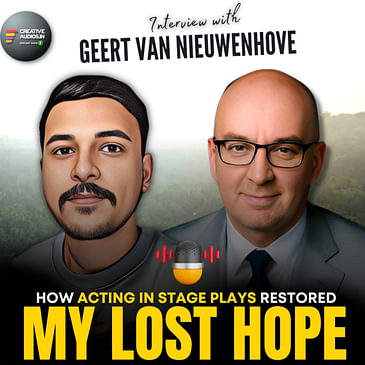From a painful teenage transformation to embracing the spotlight on stage ! unveil the riveting journey of Geert, an artist whose life reads like a script filled with transformation, trials, and triumphs.
Episode Highlights:
- Witness Geert's life-altering encounter with an actress
- Step behind the curtain into Geert's character prep process
- Explore the nuanced differences between film and stage preparation
- Be moved by Geert's standout life moment
This episode is not just for actors or theatre enthusiasts but for anyone who seeks inspiration in the art of overcoming. Geert's journey through pain, discovery, and ultimate self-expression is a testament to the transformative power of art.
Time Stamps
00:00 Coming Up Next
01:32 Introduction
04:50 Painful Teenage Transformation
06:27 That Actress Changed MY LIFE…
08:38 PERFORMING in Stage Plays
11:05 Character Prep Process
12:46 Film VS Stage Geert’s Prep Process
16:30 Standout Moment in Life
19:27 Impact of OTT Platforms
22:53 Character's Impact on Personal Life
23:39 Dealing with Uncertainty
24:59 Pivotal Moment
25:43 How Geert Prepares for an Audition
27:30 I’d love to Play a Villain
28:42 Acting Training Period
30:14 Voice Over Projects
30:58 Advice for Artists
🌟 Can't-Miss Moments:
- Delve into the impact of OTT platforms on traditional acting
- Discover how roles have influenced Geert's personal life
- Learn how Geert navigates the seas of uncertainty and pivotal career moments
- Get exclusive insight into Geert's audition preparation techniques
Listen Now!
Listen n Download FREE YOUR FAV STORIES :
Romance : https://creativeaudios.in/romance
Adventure : https://creativeaudios.in/season/23
Super Hero : https://creativeaudios.in/superheroes
Spiritual Stories : https://creativeaudios.in/spiritualstories
Crime & Mystery https://creativeaudios.in/crime-and-mystery
Sherlock Holmes : https://creativeaudios.in/season/7
Christmas stories : https://creativeaudios.in/season/25
Arabian Nights : https://creativeaudios.in/season/5
Adventures of Sinbad : https://creativeaudios.in/season/23
Freedom Fighters : https://creativeaudios.in/indianfreedomfighters
Hindi Stories : https://creativeaudios.in/hindi-kahaniyaan
Interviews with Global Artists : https://creativeaudios.in/season/26
Follow on Facebook page https://www.facebook.com/podcastaudios/
Follow us on Instagram https://www.instagram.com/podcastaudios/




